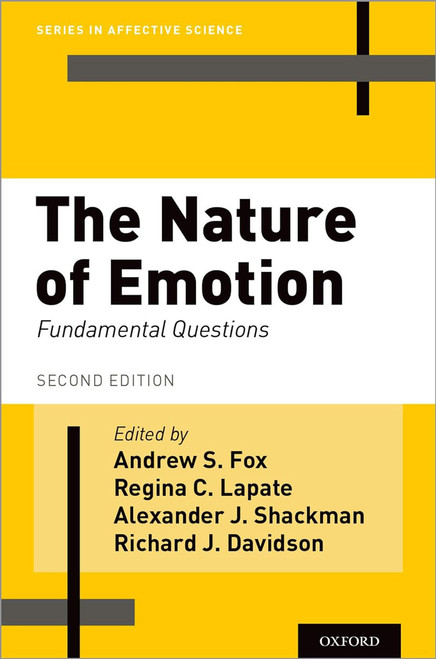Building on the legacy of the groundbreaking first edition, the Editors of this unique volume have selected more than 100 leading emotion researchers from around the world and asked them to address 14 fundamental questions about the nature and origins of emotion.
For example: What is an emotion? How are emotions organized in the brain? How do emotion and cognition interact? How are emotions embodied in the social world? How and why are emotions communicated? How are emotions physically embodied? What develops in emotional development?
At the end of each chapter, the Editors--Andrew Fox, Regina Lapate, Alexander Shackman, and Richard Davidson--highlight key areas of agreement and disagreement.
In the final chapter--The Nature of Emotion: A Research Agenda for the 21st Century--the Editors outline their own perspective on the most important challenges facing the field today and the most fruitful avenues for future research.
Not a textbook offering a single viewpoint, The Nature of Emotion reveals the central issues in emotion research and theory in the words of many of the leading scientists working in the field today, from senior researchers to rising stars, providing a unique and highly accessible guide for students, researchers, and clinicians.
Dr. Fox is an Assistant Professor in the Department of Psychology and a Neuroscience and Behavior Core Scientist in the California National Primate Research Center at the University of California, Davis. His work as a translational affective neuroscientist aims to bridge basic neuroscientific findings to our understanding of human emotion.
Dr. Lapate is a Postdoctoral Fellow at the Helen Wills Neuroscience Institute at the University of California, Berkeley. She has published a number of articles in leading psychology and neuroscience journals on the neural bases of emotion regulation and on individual differences in affective style. Her work is currently supported by the National Institute of Mental Health.
Dr. Shackman is an Assistant Professor in the Department of Psychology, a member of the executive board for the Neuroscience and Cognitive Science (NACS) Program, a core faculty member of the Maryland Neuroimaging Center, and the Director of the Affective and Translational Neuroscience Laboratory at the University of Maryland. He has published more than 50 articles and chapters focused on the neurobiology of emotion-related traits, states, and disorders and his work has been supported by the National Science Foundation and National Institutes of Mental Health and Drug Abuse. He serves as an Associate or Consulting Editor at Emotion; Cognition and Emotion; Cognitive, Affective and Behavioral Neuroscience; and Personality Neuroscience.
Dr. Davidson's research is broadly focused on the neural bases of emotion and emotional style and methods to promote human flourishing including meditation and related contemplative practices. He has published over 375 articles, numerous chapters and reviews and edited 14 books. He was named one of the 100 most influential people in the world by Time Magazine in 2006. He is the author (with Sharon Begley) of The Emotional Life of Your Brain published in 2012.
1 Review Hide Reviews Show Reviews
-
It's worth it.
A big thank you to Dogwise for carrying this book (on my request)! I know that the price tag for this book is high, but it's worth it! The Nature of Emotion pulls together short essays from the world's top experts on emotion. This is the easiest and fastest way to learn about the most current understanding of emotion in science. You will not find this information in popular press books or articles. Each chapter represents a different question about emotion. For example, "What is an Emotion?", "How are emotions regulated by context and cognition?", and "How are emotions physically embodied?". Because each chapter consists of multiple essays from different researchers, you can pick and choose which subtopics interest you the most. One of my favorite features is the summary at the end of each chapter written by the book's editors. Be forewarned, though - this book is not a light read. It's best for those who have a deep interest in the science of behavior and don't mind curling up and taking the time to do a careful read of the articles. In my mind, though, it's totally worth it!

















